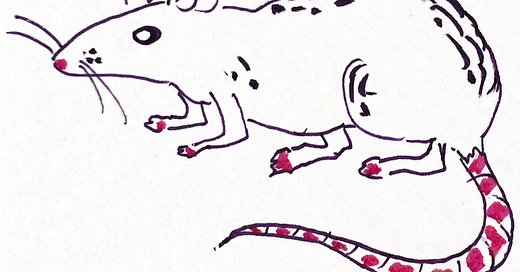My Newsletter is Like a Rat
It is omnivorous and adaptable, but it doesn't like everything equally 🐀
Hello and welcome to issue #20 of Light Gray Matters.
The progress bar is slowly filling…
I approached this newsletter as an experiment, with no goal except a numerical one: publish it 100 times. In issue #10, I reflected on the feeling of progress (or lack thereof) relative to this numerical goal. Now, I think it’s worth reflecting on the contents.
What is Light Gray Matters actually about?
My first few pieces explored the act of writing a newsletter itself, or my writing work in general. Then I went on for a month on two of the themes in Visa’s “Friendly Ambitious Nerd” holy trinity: I wrote about ambition, friendship, and communities.
After that I published a piece about cultural evolution, and then another. Quoting that last one:
I could write a whole post about that, I think. And about the common idea, for online writers such as yours truly, that you need to “find your niche.” And whether evolutionary thought might actually be my niche.
I did, of course, “write a whole post about that.” And sure enough, evolutionary thinking crept up again in some of the later posts, especially the one about beauty. But that’s not the whole story, since the rest of the posts are about pretty random topics, from spoilers to leaving my job to giving and receiving feedback.
In short, there’s a lot of diversity. If I have a niche, it is the niche of an omnivorous, omnipresent mammal. My newsletter is like a rat, eating everything it finds, and thriving in every corner of the world.
But nothing, at the individual scale, is ever truly about everything. When someone answers the question “What kind of music do you listen to?” with “I like a bit of everything,” that just means they don’t have a ready answer, not that they’re literally indifferent between listening to some bubblegum pop vs. Kind of Blue vs. the Threnody for the Victims of Hiroshima (warning: experimental 20th century music, some may find it disturbing).1
A polymath is not someone who’s good at literally everything, but someone who has a broad range of interests and is competent at many fields. To get more universal than that, you need something like a university.
And a newsletter (or book) with no specific theme isn’t literally about every single topic, except if it’s explicitly an encyclopedic work (and encyclopedias are the work of many people). Rather, it is open in theory to any topic. But over time, themes will emerge. In each issue, I choose to write about something and, by necessity, reject everything else. This process is not random.
The rat may be omnivorous, but it does have food preferences.
And while it can’t decide its food preferences in a top-down way, it can notice and observe them. If you write and talk a lot, you will eventually see what your intellectual identity is.
This is starting to happen to me.
I felt it a few days ago. It was suddenly clear how some of the ideas I think about a lot were connected. Cultural evolution. The protection of endangered languages. The reasons we see beauty. The high value I ascribe to art. Being against monolithic thought. Pronatalism. Optimism regarding the far future.
All these things are related to an underlying concept. For now, let’s call that concept “diversity.” I don’t like the word that much, though, because it is somewhat too broad. It can be interpreted in many, uh, diverse ways. Often the default interpretation is ethnic diversity, which is fine and important, but not quite what I’m talking about here.
I need to think some more about this. I haven’t quite been able to articulate my vision yet. But there is a vision to articulate. The rat has found some foods it likes, and now it needs to figure out how to cook them into a new, tasty, shareable dish.
Next week, I’ll start laying the groundwork for this vision. Until then I remain
Yours in intellectual growth,
Étienne
Also I’m not sure why all my examples ended up coming from the 1950s and 60s.






